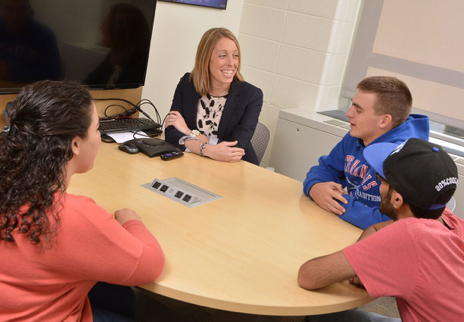Blog Entries
Behind the Curtain: Balancing the Performing Arts with a Dual Major
“Why did you decide to major in this? What are you going to do with it”?
Those two questions are ones that college students might be asked frequently, especially those who choose to major in the performing arts. Many people fail to realize that being a dancer is a viable career option and there are more career choices under the dance umbrella than just being a performer. Some examples include being a journalist for a dance magazine or going into dance administration. In addition, dancers develop transferable skills that employers want to see in their employees such as time management and work ethic. These transferable skills give performing arts students an edge over other applicants.
I started dancing when I was three and discovered early on that this was something I wanted to pursue as a career. When it came time to start looking at colleges, majoring in dance was a no-brainer. Deciding to dual major in psychology was a little bit of a different story. Freshman through junior year of high school, I was in a Biomedical Science program at school. While there were a variety of topics covered in these classes, I found myself really drawn to the topics surrounding the brain. Senior year, I decided to expand upon this interest and take AP psychology. While I was mostly sold on majoring in psychology before taking this class, taking this class sealed the deal. Regarding parental support, they were mostly supportive of my decision to major in the performing arts. The only condition was that I had to either minor or major in something else. This was not an issue because I had found something else that I was interested in thanks to them forcing me to apply for the program. While I have not closed out the idea of performing after college, I am planning to combine my two majors to become a dance/movement therapist.
While many people major in dance to have a performance career after graduating, there are many other paths that a dance degree can provide. Staying connected to performing, one could go in the theater direction such as being an actor or a movement narrator. One could also work behind the scenes of a show such as being a fashion designer, lighting designer, house manager, scenic designer, or set designer. Working in the industry, one could become an advertising specialist, artistic director, casting agent, producer, press agent, or talent agent. Other careers that can come from a dance degree that people typically do not think of include cosmetologist, manager of a dance competition, dance journalist, kinesiologist, personal trainer, cheerleader, publicist, and play writer. Even if a dance major decides to take their career on a different path, there are transferable skills such as teamwork, time management, and responsibility that carry over into all other aspects of life.
One thing I have discovered over the past two years is that people underestimate the courseload dance majors have. While most of our coursework comes from participating in class, we have papers to write and other assignments to complete. While most people have their evenings free to study and complete their homework, dance majors spend their evenings in rehearsals for upcoming concerts and projects. Also, most dance majors, at least here at DeSales, have a second major or minor to complete.
Something that I have enjoyed about being a dual major is that my day gets broken down into more manageable chunks. I have one major that is physically rigorous while the other is mentally rigorous, allowing for breaks in one area while in class where the other area is being utilized more. For example, last semester, my schedule had me alternating between psychology classes and dance classes. Having my schedule arranged this way allowed me to have mini brain breaks throughout the day. I struggle to sit still for longer periods of time, so being able to move throughout the day helped me to focus better during my lecture-based classes.
For those students who are also thinking about or are currently dual majoring, here is some advice on how to navigate college with two majors:
- Take care of yourself and your needs, and take advantage of as many opportunities as possible. There is always something going on in the performing arts division and some of these opportunities are a once-in-a-lifetime thing. Getting involved in these things could help to give your resume a boost and network with people in the industry, two things that will help you post-graduation.
- Create time blocks for everything that you need to get done. The length of the block can depend on the task at hand or how much time you have in a day to dedicate to a specified task. For example, I try to have a 2–3 hour block in the day for completing homework. This could happen if I have a long break in between classes, or it could be in between my last class of the day and either dinner or rehearsal, whichever comes first. To create a healthy school-life balance, I also block time off for myself. I try to leave nights and Sundays for myself and only do homework at those times if I absolutely must. I also avoid schoolwork on Fridays but instead, block Friday afternoons for getting other work done that is not necessarily school-related. While there are times I am staying up way later than I should be, this helps to eliminate most late-night homework sessions while creating a well-rounded balance in my life.
The pieces of advice above have probably helped me survive college the most thus far. While being a dual major certainly isn’t always easy, it is doable, and it is always worth it. I hope that this was a little bit of insight into what a performing art major looks like and how to be successful in both majors, regardless of what your career outlook looks like.
FOCUS2 is a self-paced, online career and educational planning tool. The Career Development Center encourages students to use this online resource to explore majors, minors, and career paths. Head to MyDsu→ Career Development Center→ On-Line Resources→ FOCUS 2 and use the provided access code to create an account.

Follow Career Development Center on Social
CDC on Facebook
Stay up to date with Career Development Center's posts on Facebook.
CDC on LinkedIn
See the latest posts on LinkedIn by the Career Development Center. Follow them on LinkedIn.
CDC on Instagram
See the latest posts on Instagram by Career Development Center.




